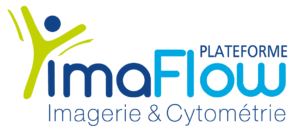OMIP - Optimised Multicolor Immunofluorescence Panels
The objective of a published OMIP is to :
- Reduce development time for researchers wishing to use identical (or very similar) panels
- Provide a starting point for the creation of new OMIPs
- Provide an attribution mechanism for panel developers via publication citation
List of published des OMIP (Update : 02/10/2023) – Click on OMIP to access the article.
- OMIP-001: Quality and Phenotype of Ag-Responsive Human T-Cells
- OMIP-002: Phenotypic Analysis of Specific Human CD8+ T-Cells Using Peptide-MHC Class I Multimers for Any of Four Epitopes
- OMIP-003: Phenotypic Analysis of Human Memory B Cells
- OMIP-004: In-Depth Characterization of Human T Regulatory Cells
- OMIP-005: Quality and Phenotype of Antigen-Responsive Rhesus Macaque T Cells
- OMIP-006: Phenotypic Subset Analysis of Human T Regulatory Cells via Polychromatic Flow Cytometry
- OMIP-007: Phenotypic Analysis of Human Natural Killer Cells
- OMIP-008: Measurement of Th1 and Th2 Cytokine Polyfunctionality of Human T Cells
- OMIP-009: Characterization of Antigen-Specific Human T-Cells
- OMIP-010: A New 10-Color Monoclonal Antibody Panel for Polychromatic Immunophenotyping of Small Hematopoietic Cell Samples
- OMIP-011: Characterization of Circulating Endothelial Cells (CECs) in Peripheral Blood
- OMIP-012: Phenotypic and Numeric Determination of Human Leukocyte Reconstitution in Humanized Mice
- OMIP-013: Differentiation of Human T-Cells
- OMIP-014: Validated Multifunctional Characterization of Antigen-Specific Human T Cells by Intracellular Cytokine Staining
- OMIP-015: Human Regulatory and Activated T-Cells Without Intracellular Staining
- OMIP-016: Characterization of Antigen-Responsive Macaque and Human T-cells
- OMIP-017: Human CD41 Helper T-cell Subsets Including Follicular Helper Cells
- OMIP-018: Chemokine Receptor Expression on Human T Helper Cells
- OMIP-019: Quantification of Human cdT-Cells, iNKT-Cells, and Hematopoietic Precursors
- OMIP-020: Phenotypic Characterization of Human cd T-cells by Multicolor Flow Cytometry
- OMIP-021: Simultaneous Quantification of Human Conventional and Innate-Like T-Cell Subsets
- OMIP-022: Comprehensive Assessment of Antigen-Specific Human T-Cell Functionality and Memory
- OMIP-023: 10-Color, 13 Antibody Panel for In-depth Phenotyping of Human Peripheral Blood Leukocytes
- OMIP-024: Pan-Leukocyte Immunophenotypic Characterization of PBMC Subsets in Human Samples
- OMIP-025: Evaluation of Human T- and NK-Cell Responses Including Memory and Follicular Helper Phenotype by Intracellular Cytokine Staining
- OMIP-026: Phenotypic Analysis of B and Plasma Cells in Rhesus Macaques
- OMIP-027: Functional analysis of human natural killer cells
- OMIP-028: Activation Panel for Rhesus Macaque NK Cell Subsets
- OMIP-029: Human NK-Cell Phenotypization
- OMIP-030: Characterization of Human T Cell Subsets via Surface Markers
- OMIP-031: Immunologic Checkpoint Expression on Murine Effector and Memory T-Cell Subsets
- OMIP-032: Two Multi-Color Immunophenotyping Panels for Assessing the Innate and Adaptive Immune Cells in the Mouse Mammary Gland
- OMIP-033: A Comprehensive Single Step Staining Protocol for Human T- and B-Cell Subsets
- OMIP-034: Comprehensive Immune Phenotyping of Human Peripheral Leukocytes by Mass Cytometry for Monitoring Immunomodulatory Therapies
- OMIP-035: Functional Analysis of Natural Killer Cell Subsets in Macaques Immunomodulatory Therapies
- OMIP-036: Co-inhibitory receptor (immune checkpoint) expression analysis in human T cell subsets
- OMIP-037: 16-color panel to measure inhibitory receptor signatures from multiple human immune cell subsets
- OMIP-038: Innate Immune Assessment with a 14 Color Flow Cytometry Panel
- OMIP-039: Detection and Analysis of Human Adaptive NKG2C+ Natural Killer Cells
- OMIP-040: Optimized Gating of Human Prostate Cellular Subpopulations
- OMIP-041: Optimized multicolor immunofluorescence panel rat microglial staining protocol
- OMIP-042: 21‐color flow cytometry to comprehensively immunophenotype major lymphocyte and myeloid subsets in human peripheral blood
- OMIP-043: Identification of human antibody secreting cell subsets
- OMIP-044: 28‐color immunophenotyping of the human dendritic cell compartment
- OMIP-045: Characterizing human head and neck tumors and cancer cell lines with mass cytometry
- OMIP-046: Characterization of invariant T cell subset activation in humans
- OMIP-047: High‐Dimensional phenotypic characterization of B cells
- OMIP-048 MC: Quantification of calcium sensors and channels expression in lymphocyte subsets by mass cytometry
- OMIP-049: Analysis of Human Myelopoiesis and Myeloid Neoplasms
- OMIP-050: A 28‐color/30‐parameter Fluorescence Flow Cytometry Panel to Enumerate and Characterize Cells Expressing a Wide Array of Immune Checkpoint Molecules
- OMIP-051: 28-Color Flow Cytometry Panel to Characterize B Cells and Myeloid Cells
- OMIP-052: An 18-Color Panel for Measuring Th1, Th2, Th17, and Tfh Responses in Rhesus Macaques
- OMIP-053: Identification, Classification, and Isolation of Major FoxP3 Expressing Human CD4+ Treg Subsets
- OMIP-054: Broad Immune Phenotyping of Innate and Adaptive Leukocytes in the Brain, Spleen, and Bone Marrow of an Orthotopic Murine Glioblastoma Model by Mass Cytometry
- OMIP-055: Characterization of Human Innate Lymphoid Cells from Neonatal and Peripheral Blood.
- OMIP-056: Evaluation of Human Conventional T Cells, Donor‐Unrestricted T Cells, and NK Cells Including Memory Phenotype by Intracellular Cytokine Staining
- OMIP-057: Mouse γδ T‐Cell Development Characterized by a 14 Color Flow Cytometry Panel
- OMIP‐058: 30‐Parameter Flow Cytometry Panel to Characterize iNKT, NK,Unconventional and Conventional T Cells
- OMIP‐059: Identification of Mouse Hematopoietic Stem and Progenitor Cells with Simultaneous Detection of CD45.1/2 and Controllable GFP Expression by a Single Staining Panel
- OMIP-060: 30-Parameter Flow Cytometry Panel to Assess T Cell Effector Functions and Regulatory T Cells.
- OMIP‐061: 20‐Color Flow Cytometry Panel for High‐Dimensional Characterization of Murine Antigen‐Presenting Cells
- OMIP‐062: A 14‐Color, 16‐Antibody Panel for Immunophenotyping Human Innate Lymphoid, Myeloid and T Cells in Small Volumes of Whole Blood and Pediatric Airway Samples
- OMIP‐063: 28‐Color Flow Cytometry Panel for Broad Human Immunophenotyping
- OMIP‐064: A 27‐Color Flow Cytometry Panel to Detect and Characterize Human NK Cells and Other Innate Lymphoid Cell Subsets, MAIT Cells, and γδ T Cells
- OMIP‐065: Dog Immunophenotyping and T‐Cell Activity Evaluation with a 14‐Color Panel
- OMIP‐066: Identification of Novel Subpopulations of Human Group 2 Innate Lymphoid Cells in Peripheral Blood
- OMIP‐067: 28‐Color Flow Cytometry Panel to Evaluate Human T‐Cell Phenotype and Function
- OMIP‐068: High‐Dimensional Characterization of Global and Antigen‐Specific B Cells in Chronic Infection
- OMIP‐069: Forty‐Color Full Spectrum Flow Cytometry Panel for Deep Immunophenotyping of Major Cell Subsets in Human Peripheral Blood
- OMIP‐070: NKp46‐Based 27‐Color Phenotyping to Define Natural Killer Cells Isolated From Human Tumor Tissues
- OMIP-071: A 31-Parameter Flow Cytometry Panel for In-Depth Immunophenotyping of Human T-Cell Subsets Using Surface Markers
- OMIP-072: A 15-color panel for immunophenotypic identification, quantification, and characterization of leukemic stem cells in children with acute myeloid leukemia
- OMIP-073: Analysis of human thymocyte development with a 14-color flow cytometry panel
- OMIP-074: Phenotypic analysis of IgG and IgA subclasses on human B cells
- OMIP-075: A 22-color panel for the measurement of antigen-specific T-cell responses in human and nonhuman primates
- OMIP-076: High-dimensional immunophenotyping of murine T-cell, B-cell, and antibody secreting cell subsets
- OMIP-077: Definition of all principal human leukocyte populations using a broadly applicable 14-color panel
- OMIP-078: A 31-parameter panel for comprehensive immunophenotyping of multiple immune cells in human peripheral blood mononuclear cells
- OMIP-079: Cell cycle of CD4+ and CD8+ naïve/memory T cell subsets, and of Treg cells from mouse spleen
- OMIP-080: 29-Color flow cytometry panel for comprehensive evaluation of NK and T cells reconstitution after hematopoietic stem cells transplantation
- OMIP-081: A new 21-monoclonal antibody 10-color panel for diagnostic polychromatic immunophenotyping
- OMIP-082: A 25-color phenotyping to define human innate lymphoid cells, natural killer cells, mucosal-associated invariant T cells, and γδ T cells from freshly isolated human intestinal tissue
- OMIP-083: A 21-marker 18-color flow cytometry panel for in-depth phenotyping of human peripheral monocytes
- OMIP-084: 28-color full spectrum flow cytometry panel for the comprehensive analysis of human γδ T cells
- OMIP-085: Cattle B-cell phenotyping by an 8-color panel
- OMIP-086: Full spectrum flow cytometry for high-dimensional immunophenotyping of mouse innate lymphoid cells
- OMIP-087: Thirty-two parameter mass cytometry panel to assess human CD4 and CD8 T cell activation, memory subsets, and helper subsets
- OMIP-088: Twenty-target imaging mass cytometry panel for major cell populations in mouse formalin fixed paraffin embedded liver
- OMIP-089: Cattle T-cell phenotyping by an 8-color panel
- OMIP-090: A 20-parameter flow cytometry panel for rapid analysis of cell diversity and homing capacity in human conventional and regulatory T cells
- OMIP-091: A 27-color flow cytometry panel to evaluate the phenotype and function of human conventional and unconventional T-cells
- OMIP-092: Characterization of rat macrophage subsets, lymphocytes, and granulocytes in bronchoalveolar lavage fluid
- OMIP-093: A 41-color high parameter panel to characterize various co-inhibitory molecules and their ligands in the lymphoid and myeloid compartment in mice
- OMIP-094: Twenty-four-color (thirty-marker) panel for deep immunophenotyping of immune cells in human peripheral blood
- OMIP-095: 40-Color spectral flow cytometry delineates all major leukocyte populations in murine lymphoid tissues.
- OMIP-096: A 24-color flow cytometry panel to identify and characterize CD4+ and CD8+ tissue-resident T cells in human skin, intestinal, and type II mucosal tissue.
- OMIP-097: High-parameter phenotyping of human platelets by spectral flow cytometry
- OMIP-098: A 26 parameter, 24 color flow cytometry panel for human memory NK cell phenotyping
- OMIP-099: 31-color spectral flow cytometry panel to investigate the steady-state phenotype of human T cells
- OMIP-100: A flow cytometry panel to investigate human neutrophil subsets
- OMIP-101: 27-color flow cytometry panel for immunophenotyping of major leukocyte populations in fixed whole blood
- OMIP-102: 50-color phenotyping of the human immune system with in-depth assessment of T cells and dendritic cells
- OMIP-103: A 35-marker imaging mass cytometry panel for the co-detection of HIV and immune cell populations in human formalin fixed paraffin embedded intestinal tissue
- OMIP-104: A 30-color spectral flow cytometry panel for comprehensive analysis of immune cell composition and macrophage subsets in mouse metabolic organs
- OMIP-105: A 30-color full-spectrum flow cytometry panel to characterize the immune cell landscape in spleen and tumor within a syngeneic MC-38 murine colon carcinoma model
- OMIP-106: A 30-color panel for analysis of check-point inhibitory networks in the bone marrow of acute myeloid leukemia patients
- OMIP-107: 8-color whole blood immunophenotyping panel for the characterization and quantification of lymphocyte subsets and monocytes in swine
- OMIP-108: 22-color flow cytometry panel for detection and monitoring of chimerism and immune reconstitution in porcine-to-baboon models of operational xenotransplant tolerance studies
- OMIP-109: 45-color full spectrum flow cytometry panel for deep immunophenotyping of the major lineages present in human peripheral blood mononuclear cells with emphasis on the T cell memory compartment


